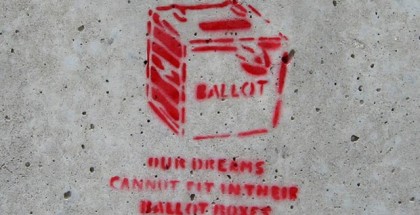The Urbanite – Jon Liedtke – Mar. 10, 2014
TO VOTE, OR NOT TO VOTE? THERE IS ANOTHER OPTION
From student council to federal politics, electors often face a ballot filled with candidates they don’t resonate with.
Voters are forced to spoil a ballot or cast it for a candidate they don’t support, but there is another option. Voting none of the above is a valid method to voice displeasure with the candidates and actively participate in democracy.
“There’s always times that people feel they want to vote but the choices are so limited,” said University of Windsor political science professor Lydia Miljan, who has studied elections throughout her career. “… to actually have an option to decline your vote is positive because it does send a message to the elected that the public isn’t happy with the choices they were offered.”
On April 30, local political activist Paul Synnott will launch declineyourvote.ca, a provincial campaign to educate voters.
“In my mind, there seems to be a lot of angst out there and dissatisfaction with the current political parties. So even though it sounds kind of counter intuitive, decline your vote is actually about encouraging people to participate in the election,” said Synnott.
Declined votes are recorded separately from spoiled ballots and are “a way to send a message to the government,” said Synnott.
“Hopefully, it will show the parties that there are thousands of votes out there that they could have if they actually were more broad based,” he said.
Miljan expressed that while some research suggests that people don’t vote due to apathy, she would be interested to see if voter turnout would increase if electors knew they could cast their ballot for none of the above.
Following a controversial undergraduate referendum in which students voted to endorse and participate in a 2005 call to Boycott, Divest and Sanction Israeli companies that profit from “war crimes,” the University of Windsor Students’ Alliance general election is off to a bumpy start with six executive and six board of directors positions running uncontested in this week’s general election.
Adam Bednarick, a concerned fourth year international relations student, launched a campaign advocating students to vote none of the above when he had heard that the UWSA chief returning officer would penalize candidates for informing students they could vote none of the above.
The campaign, which is hosted on Facebook at www.facebook.com/noneoftheabovevote, has seen students and candidates conversing back and forth during the campaign period.
“It raises a red flag and really speaks to the credibility of the UWSA and is an embarrassment on the school,” said Bednarick, referring to the uncontested positions. “It could be [that the candidates are the best options available] but there should still be others involved and others contributing to the democratic process at the UWSA.”
Bednarick believes that voting none of the above allows students “an opportunity to participate in the democratic process … I believe it’s a positive move for the [election] and for the voting process and UWSA.”
Similarly, Nick Lovell, a third-year law student, felt he had an obligation to begin a dialogue about the lack of choices for voters in the election.
UWSA executives earn $23,000 each— totaling almost$140,000 for the entire slate— which is one of the reasons Lovell has launched his campaign.
“I have no personal issue with executives being compensated for the work that they do,” said Lovell. “[$23,000] is an extremely large amount of money … it would be the equivalent of somebody handing in their resume and being given that job at this point.”
Lovell expressed that the lack of candidates running presented an atmosphere in which the UWSA “is becoming an insular incumbent-driven process where regular students are prohibited from participating.”
UWSA chief returning officer Shauhrat Gill expressed surprise at the lack of candidates running in the election. “If students decide not to run, that’s not under our control.”
Any candidate who advocates students to vote none of the above will be penalized for negative campaigning, according to Gill, as he sees it as “telling students not to vote for the candidate.”
“If students, they don’t want to vote, they’ll do that themselves,” said Gill, who has yet to formalize punishment for such actions.
Gill sees such tactics as divisive, which is not how he believes universities should be. “At university … we should be all together on an issue. We cannot be divided on issues.”
Miljan doesn’t see things as Gill does, however.
“If someone is advocating none of the above in the election, it simply means that they’re dissatisfied with the fact that there was no contest,” said Miljan. “I don’t see that as a particularly negative thing, it’s simply a way to express your point of view.”
Editors Note: Current UWSA candidates and slates were not available for comment due to an UWSA election bylaw penalizing candidates’ communication with media.
Voting none of the above as a legitimate political choice (archive.org)

Jonathon Liedtke is the managing editor of The Urbanite, Windsor’s alternative newspaper. He is also a member of Windsor’s “Punk with Horns” band The Nefidovs, and as such, is committed to enhancing and sustaining the arts community.



Leave a Reply